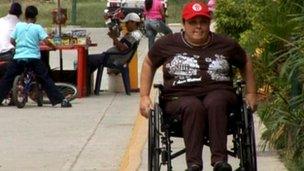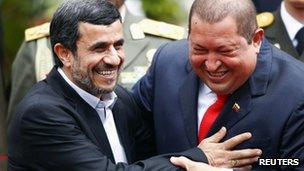Hugo Chavez: A divided and divisive legacy?
- Published
The BBC's Irene Caselli in Caracas says hundreds of Chavez supporters have gathered to mourn their "father"
The policies of President Hugo Chavez changed the lives of arguably every Venezuelan.
Some for the better, others for the worse.
Take Celia Ramos. A wheelchair user and sole carer for her five-year-old grandson, Celia became homeless a few years ago when her house in the slums of Caracas was washed away by landslides.
The government stepped in and granted her an apartment in a new development in a suburb of the capital.
"Here we have a bus service, the metro station... I had nothing like that before," she said. "There are schools, there's everything... It's marvellous."
Celia's benefits did not stop there.
She was given a job in one of the government run "areperas socialistas" - cafes that sell Venezuela's staple food, the arepa (a kind of fried corn pancake) at subsidised prices.
Voice of the poor
In more than 13 years of government, Hugo Chavez launched an array of programmes designed to improve the lives of the country's poor.

Celia Ramos says her life improved under Hugo Chavez
His "Barrio Adentro" scheme brought hundreds of Cuban medics to Venezuela to staff new health centres in some of the country's poorest neighbourhoods.
Some of the tens of thousands of hectares of land that he expropriated from multinational companies were given over to aspiring farmers for subsistence agriculture.
He built an innovative cable car system so that slum-dwellers in Caracas whose houses were built precariously on hillsides, could more easily access the centre of the capital.
What all these schemes achieved, beyond their simple stated aims, was to raise the profile of a sector of Venezuelan society that had hitherto been neglected.
Even opposition supporters admit his work to address social inequalities was important.
"In 1999, things were very unfair and we needed a Chavez," said Ana, a well-to-do lawyer.
He gave a voice and identity to the poor, not just at home but also on the international stage.
He was a determined advocate of South-South dialogue, building close relations with ideologically like-minded presidents across Latin America.
He raised the profile of Venezuela into that of an international player, forming alliances with anyone who opposed the US (Iran, North Korea, Libya under Muammar Gaddafi).
"Within his administration he gave opportunities to people who would never have had them otherwise," said political analyst Carlos Romero.
Shortages
But his methods were roundly condemned by sectors of society that found themselves out of favour.

Iranian President Mahmoud Ahmadinejad made a number of visits to Venezuela
"There's never been as big a division of the classes as there is now," said Mr Romero.
President Chavez's championing of the poor came at the expense of Venezuela's middle class, which he branded as "esqualidos", the weak ones.
His rhetoric was divisive, pitting Venezuelans against each other and creating a highly polarised society.
His management of the country's economy also came in for much criticism.
His policy of expropriations, which often seemed arbitrary or spiteful, led to a lack of confidence, scaring off many foreign investors.
Productivity dropped as expropriated land lay undeveloped and Venezuela came to rely heavily on expensive imported food, rather than home-grown produce.
Attempts to curb the inflation rate with price freezes only led to shortages of basic products. Supermarkets shelves were often empty of milk, cooking oil and sugar.
Despite plenty of criticism from political opponents, Mr Chavez triumphed repeatedly at the ballot box and he successfully overcame a coup attempt against him in 2002.
His style of government was extremely centralised and the country's institutions were built around him.
He leaves a Venezuela that will struggle to replace him.
- Published8 October 2011
- Published13 June 2011
- Published18 February 2013